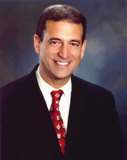
To his critics, Gonzales is a Bush yes-man who never really left the White House and who continues to front for a commander-in-chief intent on illegitimately expanding his powers at the expense of civil liberties and in disregard of the legislative and judicial branches. Gonzales seems to have no agenda of his own, detractors say: He appears content to serve as the president's defense attorney rather than as the nation's top cop and prosecutor.
Will he be remembered in history books as an apologist of the Bush policies on torture and illegal spying?
The tension between serving two masters -- the Constitution and the president -- defined the tenures of many of Gonzales's predecessors
The ACLU considers independence the hallmark of good attorneys general, and by any measure, Gonzales certainly isn't neutral about Bush's agenda. "Attorney General Gonzales has displayed a shocking lack of independence.
Between advocating for renewal of the PATRIOT Act and defending the National Security Agency's warrantless wiretapping program, Gonzales spent much of his first year explaining the Bush administration's rationale for exercising presidential powers far broader than its critics -- and even some of its allies -- think the Constitution allows.
Last month, the attorney general grounded his most public defense of the administration in its war on terror. Appearing before the Senate Judiciary Committee on February 6 to defend the controversial NSA program, Gonzales invoked various statutes, the Constitution, and several court rulings in contending that, despite restrictions in the Foreign Intelligence Surveillance Act, the president has the authority to eavesdrop without a warrant on U.S. citizens who are in contact with suspected terrorists abroad. Four of the panel's 10 Republicans, including Chairman Arlen Specter of Pennsylvania, don't buy Gonzales's legal analysis. Neither does any of the committee's eight Democrats. Specter has drafted legislation to require the FISA court to review the legality and constitutionality of the warrantless eavesdropping.
Many Gonzales critics argue that the NSA's eavesdropping is only a symptom of a much larger malady -- that the attorney general is allowing the president to use the war on terror as an excuse to drastically curtail Americans' basic freedoms. "The administration's view is that the entire world, including every inch of U.S. territory, is akin to a battlefield and that, therefore, if the president decides that he wants to order an arrest or search, then warrants are not necessary," said Tim Lynch, a legal analyst at the Cato Institute. "The real controversy is, is the United States of America a battlefield or not?"
Gonzales's own legacy may well depend on whether his friendship with the president ultimately benefits the nation. "The bottom line is how power is used," professor Baker said. "Attorneys general ultimately disserve their presidents when they forget their other duties to the Constitution."










